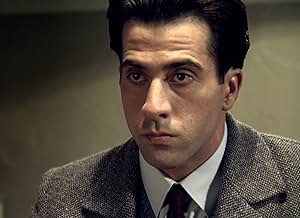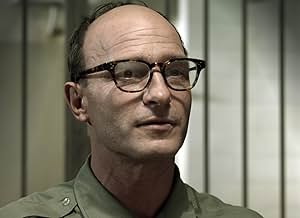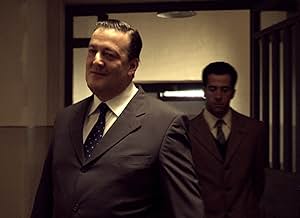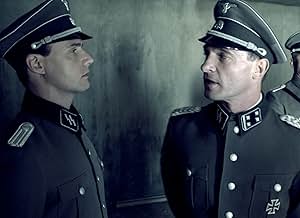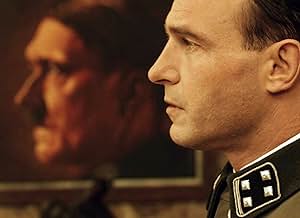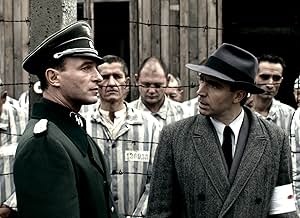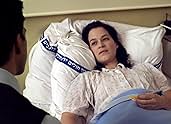VALUTAZIONE IMDb
5,9/10
3670
LA TUA VALUTAZIONE
La vita di Adolf Eichmann, uno dei più importanti gerarchi nazisti, ricostruita attraverso la confessione fatta prima di essere giustiziato in Israele.La vita di Adolf Eichmann, uno dei più importanti gerarchi nazisti, ricostruita attraverso la confessione fatta prima di essere giustiziato in Israele.La vita di Adolf Eichmann, uno dei più importanti gerarchi nazisti, ricostruita attraverso la confessione fatta prima di essere giustiziato in Israele.
- Regia
- Sceneggiatura
- Star
Avner W. Less
- Self
- (filmato d'archivio)
- (voce)
Tereza Srbova
- Baroness Ingrid von Ihama
- (as Tereza Srbová)
Tilly O'Neil
- Hannah
- (as Tilly Golding)
Recensioni in evidenza
There are a lot of things about "Eichmann" which seem curiously wrong. For one thing, this Eichmann is a lot more interesting and colourful than the real man appears to have been. There's a bizarre scene in which he is challenged by his very weird Hungarian mistress to shoot a baby; I won't give away whether or not he does so, but it's not something I've ever heard of before. This Eichmann is a womaniser, a bit of a boozer, altogether a more louche and raffish figure than the rather dull bureaucrat that I've always read Eichmann described as.
Yes, the film suffers from some weird accents. Thomas Kretschmann, as Eichmann himself, speaks in a clipped German accent; Troy Garity, Franka Potente and Stephen Fry (in a bizarre but oddly convincing performance as, of all things, the Israeli Minister of Justice) all have indeterminately foreign accents, and none of it really makes sense.
Having said that, Kretschmann carries off the job he has been asked to do, and Garity is really very good as Avner Less, who was not Eichmann's prosecutor (as someone else stated) but his interrogator. Less was not a lawyer but a police officer. The subplot of his wife being chronically ill is presumably there because it was true; it would have been better if they'd left it out, because what drama there is in this film is the battle of wills between Less the dogged interrogator and Eichmann the stolidly evasive interrogatee.
I note in passing that Stephen Fry might almost be the rather more well-fed first cousin, or perhaps uncle, of Ciaran Hinds in "Munich". The accent is the same, and the tallness, slicked-down hair and intimidating bulk is very similar.
If they'd toned down the lurid stuff about Eichmann's sex life and focused on what he actually did for a living, this could have been as good as "Conspiracy". Pity.
Yes, the film suffers from some weird accents. Thomas Kretschmann, as Eichmann himself, speaks in a clipped German accent; Troy Garity, Franka Potente and Stephen Fry (in a bizarre but oddly convincing performance as, of all things, the Israeli Minister of Justice) all have indeterminately foreign accents, and none of it really makes sense.
Having said that, Kretschmann carries off the job he has been asked to do, and Garity is really very good as Avner Less, who was not Eichmann's prosecutor (as someone else stated) but his interrogator. Less was not a lawyer but a police officer. The subplot of his wife being chronically ill is presumably there because it was true; it would have been better if they'd left it out, because what drama there is in this film is the battle of wills between Less the dogged interrogator and Eichmann the stolidly evasive interrogatee.
I note in passing that Stephen Fry might almost be the rather more well-fed first cousin, or perhaps uncle, of Ciaran Hinds in "Munich". The accent is the same, and the tallness, slicked-down hair and intimidating bulk is very similar.
If they'd toned down the lurid stuff about Eichmann's sex life and focused on what he actually did for a living, this could have been as good as "Conspiracy". Pity.
This acceptable biopic deals basically with the pretrial interrogation of Adolf Eichmann after he was captured in Argentina and brought to Israel. In the interrogation, he insists his role in the Holocaust was minor, just a sort of transport commissioner who has to make sure the different prisoners arrive on time at each concentration camp. This is contrasted with flashbacks from Eichmann during World War II, showing him directly in charge of the extermination of Jews. His main interrogator is a police captain, and the movie shows some of his background, how his role affects his family life, etc. German actor Thomas Kretschmann, who has made a career of playing Nazi officers (in Downfall, Stalingrad and Valkyrie, for instance) is very good as the Nazi criminal. So is Troy Garity playing the Israeli detective. Maybe the movie would have benefited from a larger scope – it includes nothing of Eichmann during the trial itself, very few about his life in Argentina, his capture is dealt in just one quick scene. And there were a few scenes that sounded false to me. For example, Eichmann is seen making love to a Hungarian mistress during the war and to get her hot he tells her the amounts of people he ordered killed. Or in another scene the same lady dares Eichmann to kill a baby. Maybe it really happened but the way it is portrayed in the movie sounded downright false and tasteless to me. These few objections aside, this is not a bad film.
I do not typically submit such reviews, but this film cries out for comments. "Using" the inherently dramatic and compelling nature of the Nazi period to create a largely inaccurate film seems to be another kind of crime. Such a period of evil deserves the most sober treatment possible and should not be used to create a kind of historic horror film.
All of that is leading up to my strong suggestion that you skip the film and read Hannah Arendt's amazing book about the actual Eichmann trial in Jerusalem, Eichmann: A Report on the Banality of Evil. Here you will find a non-dramatic, non-titillating version of the story that neither exaggerates nor diminishes Eichmann's evil, but rather reveals him in a matter-of-fact way as an opportunist, a careerist who merely wanted to advance, climb the ladder, attain the next "title," etc. He apparently did not have any particular hatred toward Jews. None of this in my estimation makes him less evil; the book actually reveals the "banality" of his evil by taking away the specter of a crazed monster. His evil lies in its being sane and in a sense "ordinary." Therefore, given its serious subject matter, I feel the film only partially reflects the facts Arendt reveals so clearly, obscuring them with with sex and useless side stories. The performances are good, the film is well made, etc. That's not my point. If you want to make a formulaic film, a horror film, a sexy film, or any other kind of film, have at it. But don't use Eichmann as your subject matter. The subject matter is too serious to be misused in any way. Read the book, please.
All of that is leading up to my strong suggestion that you skip the film and read Hannah Arendt's amazing book about the actual Eichmann trial in Jerusalem, Eichmann: A Report on the Banality of Evil. Here you will find a non-dramatic, non-titillating version of the story that neither exaggerates nor diminishes Eichmann's evil, but rather reveals him in a matter-of-fact way as an opportunist, a careerist who merely wanted to advance, climb the ladder, attain the next "title," etc. He apparently did not have any particular hatred toward Jews. None of this in my estimation makes him less evil; the book actually reveals the "banality" of his evil by taking away the specter of a crazed monster. His evil lies in its being sane and in a sense "ordinary." Therefore, given its serious subject matter, I feel the film only partially reflects the facts Arendt reveals so clearly, obscuring them with with sex and useless side stories. The performances are good, the film is well made, etc. That's not my point. If you want to make a formulaic film, a horror film, a sexy film, or any other kind of film, have at it. But don't use Eichmann as your subject matter. The subject matter is too serious to be misused in any way. Read the book, please.
I have to agree with everything lexo said about this drama; and I say drama because I was never wholly convinced I was witnessing history.
When I bought this title I was expecting a detailed examination of "the architect of Hitler's plan"; no matter the bias. All I received in return was a turgid family drama set against a few pointless conversations between the police captain Less and Eichmann. Once sensationalised by dubious episodes in the man's Nazi career all that remained were constant accusations and denials by Less and Eichmann. Admittedly this man may not have been exciting or even entertaining within the Nazi regime, but one thing he most certainly was, was life-changing.
There is an interested audience for films that seek to examine the minds of the "architects of Hitler's plan", as Oliver Hirschbiegel's "Downfall" has shown. Studying German history I was more concerned with the Socialists than the National Socialists, but the Nazi motivation and objectives are still a fascinating aspect of 20th Century History. "Eichmann" however does nothing to advance the understanding of the Nazis, nor the Eichmann that oiled the wheels of the Holocaust, and seems more like Jewish apologia for interrogating Eichmann by a man who suffered personal tragedy in the Holocaust, convicted him on mere supposition and rumour, and murdered him because of intense social and political pressure.
When I bought this title I was expecting a detailed examination of "the architect of Hitler's plan"; no matter the bias. All I received in return was a turgid family drama set against a few pointless conversations between the police captain Less and Eichmann. Once sensationalised by dubious episodes in the man's Nazi career all that remained were constant accusations and denials by Less and Eichmann. Admittedly this man may not have been exciting or even entertaining within the Nazi regime, but one thing he most certainly was, was life-changing.
There is an interested audience for films that seek to examine the minds of the "architects of Hitler's plan", as Oliver Hirschbiegel's "Downfall" has shown. Studying German history I was more concerned with the Socialists than the National Socialists, but the Nazi motivation and objectives are still a fascinating aspect of 20th Century History. "Eichmann" however does nothing to advance the understanding of the Nazis, nor the Eichmann that oiled the wheels of the Holocaust, and seems more like Jewish apologia for interrogating Eichmann by a man who suffered personal tragedy in the Holocaust, convicted him on mere supposition and rumour, and murdered him because of intense social and political pressure.
When a film's starting sentence is 'based on a true story' or if you know that the story behind the film actually took place, you expect at least the facts to be close to reality. I'll put aside the embarrassing mistakes in Hebrew (didn't you have Israeli actors on the set?), what troubles me more is the inaccuracies in historical facts, and the actual 'creation' of allegedly legal documentations that never existed. Furthermore, the addition of plot lines that portray Eichmann as a brutal murderer, and as a 'valentino', are not correct, add nothing to the plot (apart from the female nudity, which is entirely not required in this movie), and miss the horrible fact that Eichmann, like many many officers in the German Reich was a gray man, who just filed documents that sent millions to their death. This movie is a shame for the viewers' intelligence. Ignoring the historical errors and the made up plot lines, the movie itself is not interesting, the characters are superficial and empty, and if there's an intention to create a 'duel' between Eichmann and Less, it is artificial and is futile.
Lo sapevi?
- QuizAccording to a British reporter on location, fellow cast members Troy Garity and Thomas Kretschmann were so upset with script revisions of the baby-in-office scene that Kretschmann promptly threw them in the trash, explaining, 'I'll just file this here for safekeeping.' The revisions were later dropped.
- Blooper(at around 1 min) In the scene where the minister leaves the room after telling Avner that his father had been sent to Auschwitz by Eichmann, a large contemporary map of Europe is visible on the wall. The maps contains the re-unified Germany, the successor states of the Soviet Union, the broken up former Yugoslavia, and the split Czech and Slovak Republics - which is the late 1990s status and not 1960/61.
- Citazioni
Avner Less: [after Eichmann's interrogation and trial] We showed him more justice than he ever showed us.
- Colonne sonoreAlma Partida
Words and Music by Mauricio Vanegas
West One Music Ltd
I più visti
Accedi per valutare e creare un elenco di titoli salvati per ottenere consigli personalizzati
- How long is Eichmann?Powered by Alexa
Dettagli
- Data di uscita
- Paesi di origine
- Sito ufficiale
- Lingue
- Celebre anche come
- Adolf Eichmann
- Luoghi delle riprese
- Aziende produttrici
- Vedi altri crediti dell’azienda su IMDbPro
Botteghino
- Budget
- 8.000.000 USD (previsto)
- Lordo Stati Uniti e Canada
- 2706 USD
- Fine settimana di apertura Stati Uniti e Canada
- 573 USD
- 31 ott 2010
- Lordo in tutto il mondo
- 2706 USD
- Tempo di esecuzione
- 1h 36min(96 min)
- Colore
- Mix di suoni
- Proporzioni
- 1.85 : 1
Contribuisci a questa pagina
Suggerisci una modifica o aggiungi i contenuti mancanti


